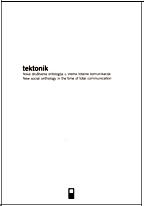tektonik, New social onthology in the time of total communication, kuda.org
tektonik is a collection of texts, transcripts of lectures and interviews with researchers, theoreticians, artists and activists who have been guests of the kuda.lounge program between 2001 and 2004 at the kuda.org New Media Center. The selected texts, lectures and interviews in this edition are a kind of research intersection in the domain of new technologies, culture and society, research of phenomena such as globalization, technological systems of control, mass communication and the Internet, new social movements, the new proletariat and new economy, the problem of intellectual property rights, and biotechnology. Given that society at the beginning of the twenty-first century is a media-saturated global society, particular focus has been directed towards the problem of the mediation of information which creates current reality.
From the very outset kuda.lounge has been a platform for discussion, argumentation and dialog, in the framework of which more than fifty presentations, lectures and workshops have been organized. In inviting key names involved in critical thinking and social theory and practice, kuda.org has attempted to offer the local public an insight into contemporary social questions in the world and to establish frequent and lasting communication and cooperation between local theoriticians and activists and an international network. At kuda.org the public has had the opportunity to hear lectures from Saskie Sassen, Steve Kurtz, Geert Lovink, Konrad Becker, Cindy Cohn and many others.
The development of information and communication technologies has introduced a new social ontology which has manifested itself on the political, cultural, economic and psychological plane. In a time when the promises of a techno-utopia are being transformed into highly-operationalized intelligent machines which serve economic interests, or into trainee virtual units for future conflicts (parallel education and training via computer games as combat simulation, unmanned flying craft - predators), the question is, to what extent can new technologies be used to fulfill some of the promises, pressing in the eighties and early nineties, in the prime of the so-called California ideology? Those promises included social prosperity, creative work, the creation of new workplaces, shortened working hours, global peace in an era of global enlightenment enabled by technology.
Via the texts in this collection we come face to face with warning projections of a dehumanized future determined by the interests of capital, a telling critique of technical-science as the ultimate generator of the capitalist machine. In opposition to this, we can see models of how the potential of new information and communication technologies can be used for democratization and realization of the project of a "better society".
During the nineties the Balkans was a real battlefield where these global theories "fell in the water" and intersected with specific local interests. A particular idiosyncracy of the local context in the countries of the former Yugoslavia was the comprising of socialism as an idea, the direct or indirect threat of war, life in authoritarian centralism or in a neo-liberal framework of roughshod transition, which also precipitated distrust in broader social action. Parallel with the wars of the nineties, in Serbia a model of accelerated privatization of the public space and an 'accelerated end' of the industrial society was carried out, after which Serbian society found itself in limbo between its industrial past and an information-based future, waiting for the reopening of factories that would never be reopened.
The goal of the lectures and discussions was to critically analyze certain socio-political phenomena, to point to the root of the problem and present this to a wider public. The kuda.org center opens the possibility and space of different interpretations and models of the past, present and future social context, mapping those processes which could potentially endanger human freedom using the sophisticated methods of a high-tech society in a time of the knowledge economy. With the publication of this collection we conclude a cycle which has integrated subjects detecting general social problems, and in a "classical" print medium present them to a wider public.
Publisher: Futura publikacije, Novi Sad
Series: kuda.read 001
Editorial board: kuda.org
Translation into Serbian: Bojana Petrić, Orfeas Skutelis, Marijana Macura, Nikolina Knežević
Translation into English: David Williams
English Proofreading: David Williams, Nikolina Knežević
Serbian Proofreading: Silvija Čamber
Graphic design: Veljko Damjanović
Layout: Veljko Damjanović
Printed by Futura, Novi Sad
Print run: 1000
ISBN 86-7188-026-5
This work is licensed under a Creative Commons Attribution-NonCommercial-ShareAlike 2.5 License.
http://creativecommons.org/licenses/by-nc-sa/2.5/

